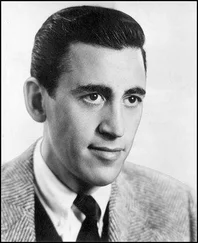Jerome Salinger - Nine Stories
Здесь есть возможность читать онлайн «Jerome Salinger - Nine Stories» весь текст электронной книги совершенно бесплатно (целиком полную версию без сокращений). В некоторых случаях можно слушать аудио, скачать через торрент в формате fb2 и присутствует краткое содержание. Год выпуска: 1953, Издательство: Little Brown, Жанр: Классическая проза, на английском языке. Описание произведения, (предисловие) а так же отзывы посетителей доступны на портале библиотеки ЛибКат.
- Название:Nine Stories
- Автор:
- Издательство:Little Brown
- Жанр:
- Год:1953
- ISBN:нет данных
- Рейтинг книги:4 / 5. Голосов: 2
-
Избранное:Добавить в избранное
- Отзывы:
-
Ваша оценка:
- 80
- 1
- 2
- 3
- 4
- 5
Nine Stories: краткое содержание, описание и аннотация
Предлагаем к чтению аннотацию, описание, краткое содержание или предисловие (зависит от того, что написал сам автор книги «Nine Stories»). Если вы не нашли необходимую информацию о книге — напишите в комментариях, мы постараемся отыскать её.
Nine Stories — читать онлайн бесплатно полную книгу (весь текст) целиком
Ниже представлен текст книги, разбитый по страницам. Система сохранения места последней прочитанной страницы, позволяет с удобством читать онлайн бесплатно книгу «Nine Stories», без необходимости каждый раз заново искать на чём Вы остановились. Поставьте закладку, и сможете в любой момент перейти на страницу, на которой закончили чтение.
Интервал:
Закладка:
ACKNOWLEDGMENTS
Of the nine stories to the book the following seven appeared originally in THE NEW YORKER; “A Perfect Day for Bananafish,” “Uncle Wiggily in Connecticut,” “Just Before the War with the Eskimos,” “The Laughing Man,” “For Esme:-with Love and Squalor,” “Pretty Mouth and Green My Eyes,” and “Teddy.” The author is grateful to THE NEW YORKER for permission to reprint.
The author also wishes to thank HARPER’S MAGAZINE for permission to reprint “Down at the Dinghy.”
Copyright, 1948, 1949, 1950, 1951, 1953, by J. D. Salinger.
Dedication
TO DOROTHY OLDING and GUS LOBRANO
J.D. Salinger
NINE STORIES
We know the sound of two hands clapping. But what is the sound of one hand clapping?
—A ZEN KOALA
A Perfect Day for Bananafish
THERE WERE ninety-seven New York advertising men in the hotel, and, the way they were monopolizing the long-distance lines, the girl in 507 had to wait from noon till almost two-thirty to get her call through. She used the time, though. She read an article in a women’s pocket-size magazine, called “Sex Is Fun-or Hell.” She washed her comb and brush. She took the spot out of the skirt of her beige suit. She moved the button on her Saks blouse. She tweezed out two freshly surfaced hairs in her mole. When the operator finally rang her room, she was sitting on the window seat and had almost finished putting lacquer on the nails of her left hand.
She was a girl who for a ringing phone dropped exactly nothing. She looked as if her phone had been ringing continually ever since she had reached puberty.
With her little lacquer brush, while the phone was ringing, she went over the nail of her little finger, accentuating the line of the moon. She then replaced the cap on the bottle of lacquer and, standing up, passed her left—the wet—hand back and forth through the air. With her dry hand, she picked up a congested ashtray from the window seat and carried it with her over to the night table, on which the phone stood. She sat down on one of the made-up twin beds and—it was the fifth or sixth ring—picked up the phone.
“Hello,” she said, keeping the fingers of her left hand outstretched and away from her white silk dressing gown, which was all that she was wearing, except mules—her rings were in the bathroom.
“I have your call to New York now, Mrs. Glass,” the operator said.
“Thank you,” said the girl, and made room on the night table for the ashtray.
A woman’s voice came through. “Muriel? Is that you?”
The girl turned the receiver slightly away from her ear. “Yes, Mother. How are you?” she said.
“I’ve been worried to death about you. Why haven’t you phoned? Are you all right?”
“I tried to get you last night and the night before. The phone here’s been—”
“Are you all right, Muriel?”
The girl increased the angle between the receiver and her ear. “I’m fine. I’m hot. This is the hottest day they’ve had in Florida in—”
“Why haven’t you called me? I’ve been worried to—”
“Mother, darling, don’t yell at me. I can hear you beautifully,” said the girl. “I called you twice last night. Once just after—”
“I told your father you’d probably call last night. But, no, he had to-Are you all right, Muriel? Tell me the truth.”
“I’m fine. Stop asking me that, please.”
“When did you get there?”
“I don’t know. Wednesday morning, early.”
“Who drove?”
“He did,” said the girl. “And don’t get excited. He drove very nicely. I was amazed.”
“He drove? Muriel, you gave me your word of—”
“Mother,” the girl interrupted, “I just told you. He drove very nicely. Under fifty the whole way, as a matter of fact.”
“Did he try any of that funny business with the trees?”
“I said he drove very nicely, Mother. Now, please. I asked him to stay close to the white line, and all, and he knew what I meant, and he did. He was even trying not to look at the trees-you could tell. Did Daddy get the car fixed, incidentally?”
“Not yet. They want four hundred dollars, just to—”
“Mother, Seymour told Daddy that he’d pay for it. There’s no reason for—”
“Well, we’ll see. How did he behave—in the car and all?”
“All right,” said the girl.
“Did he keep calling you that awful—”
“No. He has something new now.”
“What?”
“Oh, what’s the difference, Mother?”
“Muriel, I want to know. Your father—”
“All right, all right. He calls me Miss Spiritual Tramp of 1948,” the girl said, and giggled.
“It isn’t funny, Muriel. It isn’t funny at all. It’s horrible. It’s sad, actually. When I think how—”
“Mother,” the girl interrupted, “listen to me. You remember that book he sent me from Germany? You know—those German poems. What’d I do with it? I’ve been racking my—”
“You have it.”
“Are you sure?” said the girl.
“Certainly. That is, I have it. It’s in Freddy’s room. You left it here and I didn’t have room for it in the—Why? Does he want it?”
“No. Only, he asked me about it, when we were driving down. He wanted to know if I’d read it.”
“It was in German!”
“Yes, dear. That doesn’t make any difference,” said the girl, crossing her legs. “He said that the poems happen to be written by the only great poet of the century. He said I should’ve bought a translation or something. Or learned the language, if you please.”
“Awful. Awful. It’s sad, actually, is what it is. Your father said last night—”
“Just a second, Mother,” the girl said. She went over to the window seat for her cigarettes, lit one, and returned to her seat on the bed. “Mother?” she said, exhaling smoke.
“Muriel. Now, listen to me.”
“I’m listening.”
“Your father talked to Dr. Sivetski.”
“Oh?” said the girl.
“He told him everything. At least, he said he did—you know your father. The trees. That business with the window. Those horrible things he said to Granny about her plans for passing away. What he did with all those lovely pictures from Bermuda—everything.”
“Well?” said the girl.
“Well. In the first place, he said it was a perfect crime the Army released him from the hospital—my word of honor. He very definitely told your father there’s a chance—a very great chance, he said—that Seymour may completely lose control of himself. My word of honor.”
“There’s a psychiatrist here at the hotel,” said the girl.
“Who? What’s his name?”
“I don’t know. Rieser or something. He’s supposed to be very good.”
“Never heard of him.”
“Well, he’s supposed to be very good, anyway.”
“Muriel, don’t be fresh, please. We’re very worried about you. Your father wanted to wire you last night to come home, as a matter of f—”
“I’m not coming home right now, Mother. So relax.”
“Muriel. My word of honor. Dr. Sivetski said Seymour may completely lose contr—”
“I just got here, Mother. This is the first vacation I’ve had in years, and I’m not going to just pack everything and come home,” said the girl. “I couldn’t travel now anyway. I’m so sunburned I can hardly move.”
“You’re badly sunburned? Didn’t you use that jar of Bronze I put in your bag? I put it right—”
“I used it. I’m burned anyway.”
“That’s terrible. Where are you burned?”
“All over, dear, all over.”
“That’s terrible.”
Читать дальшеИнтервал:
Закладка:
Похожие книги на «Nine Stories»
Представляем Вашему вниманию похожие книги на «Nine Stories» списком для выбора. Мы отобрали схожую по названию и смыслу литературу в надежде предоставить читателям больше вариантов отыскать новые, интересные, ещё непрочитанные произведения.
Обсуждение, отзывы о книге «Nine Stories» и просто собственные мнения читателей. Оставьте ваши комментарии, напишите, что Вы думаете о произведении, его смысле или главных героях. Укажите что конкретно понравилось, а что нет, и почему Вы так считаете.











